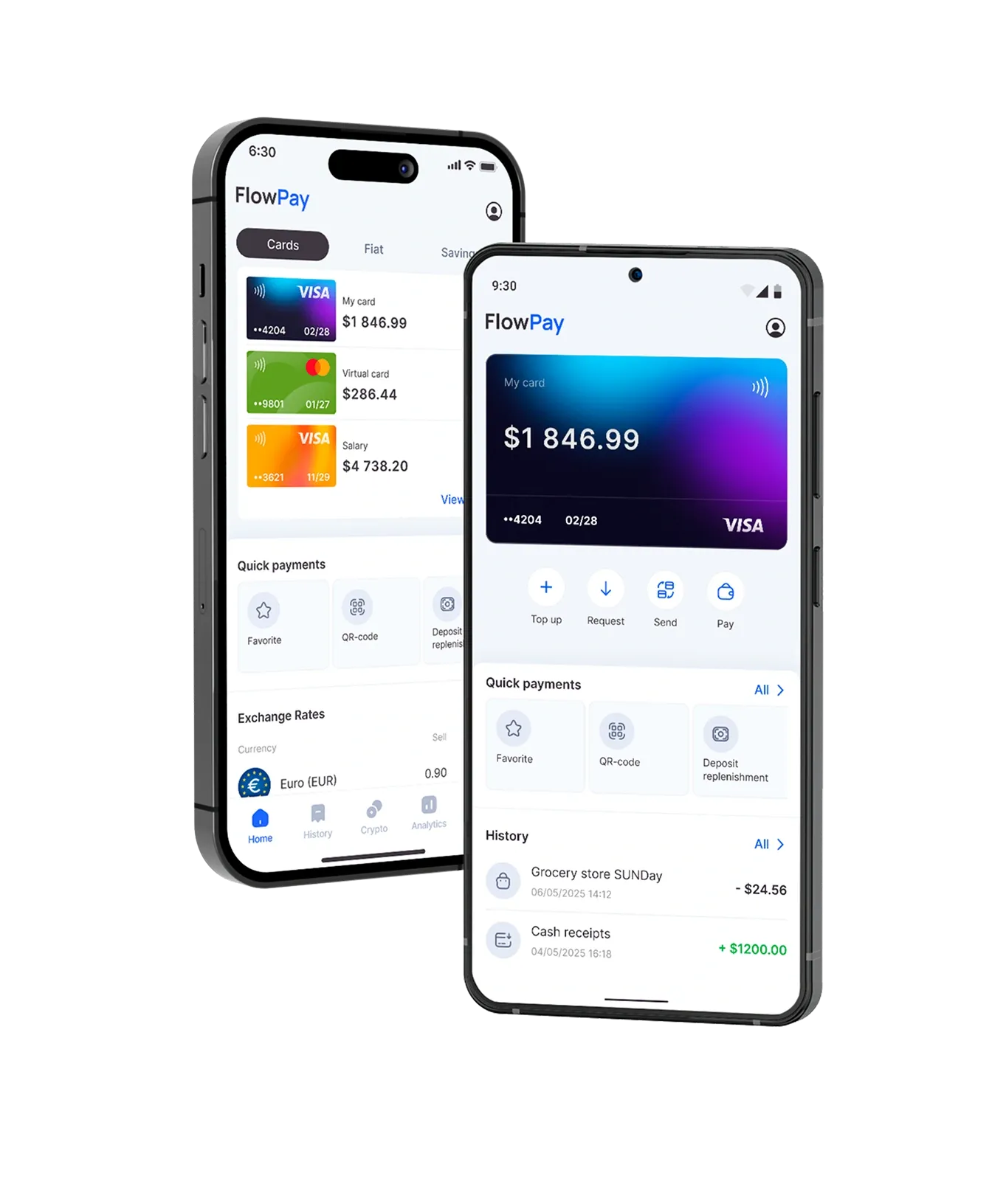
Reinvented fintech app with Kotlin multiplatform development
From siloed to seamless: How we unified fintech mobile development
40%
lower maintenance costs
30%
faster feature releases
50%
higher team efficiency

Challenge
Solution
Tech stack
Client
Our client is a leading mobile financial services provider offering peer-to-peer payments, banking features, and cryptocurrency transactions. To drive innovation and accelerate growth, the company sought a more efficient development approach – one that ensures a flawless user experience while optimizing performance across platforms.

Challenge
Before implementing the new solution, the client encountered several challenges that slowed down development and affected performance. The reliance on separate native Android and iOS implementations led to duplicated effort, inconsistencies, and delays in feature releases.
To overcome these issues, Modsen Kotlin multiplatform developers focused on key objectives:
Unify the development process to reduce duplication and improve efficiency by adopting Kotlin for mobile development.
Maintain a native UI experience while sharing business logic seamlessly.
Enhance developer productivity with a scalable and maintainable codebase.
Ensure a smooth, high-performance user experience across platforms.

Got a similar software development project on your mind?
Leave your email and our experts will get in touch with you to specify your project challenges and provide an accurate estimation of the cost and duration of our cooperation.
Team
3
Mobile Engineers
2
UX Designers
2
Back-end Engineers
1
Project Manager
2
QA Engineers
1
Team Lead
1
DevOps Specialist

Development process
Requirements gathering and processing
To streamline development and increase efficiency, we conducted a thorough analysis of the existing system. The team identified key inefficiencies in maintaining separate native Android and iOS codebases, which led to duplication of effort and inconsistencies. By leveraging Kotlin for mobile app development, we aimed to unify the development process while ensuring high performance.
Planning
Embracing an Agile approach, we designed a structured migration strategy to implement Kotlin Multiplatform Mobile (KMM) while maintaining development velocity. Through iterative sprints, specialists listed key business logic components for shared implementation, ensuring measurable improvements at each stage. A phased adoption roadmap was established, enabling incremental KMM integration with continuous testing and feedback loops.
Team assembly
Building the right team was a top priority, and we left nothing to chance. Every engineer was handpicked through a meticulous selection process, ensuring deep expertise in Kotlin multiplatform development. Candidates underwent rigorous technical interviews, with the CTO personally engaging with each finalist to guarantee the highest standards of skill and collaboration. This careful curation resulted in a powerhouse team of Android and backend engineers, fully equipped to drive seamless shared logic implementation.
Design
To deliver a sleek, intuitive user experience, Modsen Design Studio crafted a visually striking and highly functional UI, tailored to enhance usability across platforms. With the UI foundation in place, we embraced a “shared business logic, native UI” strategy, ensuring platform-specific experiences while unifying core functionality with KMM. A shared repository was established, enabling Android and iOS teams to collaborate efficiently, while maintaining full compatibility with the existing Kotlin-based server infrastructure.
Once finalized, the design was seamlessly handed off to the development team, setting the stage for a smooth transition from concept to code.

Product building
To ensure a seamless transition, our engineers introduced KMM behind feature flags, allowing for a controlled, risk-free rollout. This approach enabled us to test and refine shared logic without disrupting the existing user experience.
The migration focused on key backend components, starting with persistence layers and network APIs. By unifying these core functionalities under Kotlin for Android development, we eliminated redundant platform-specific implementations, improving efficiency and maintainability. Additionally, we implemented a streamlined approach to data management and communication between app layers, ensuring seamless integration across platforms.
By gradually expanding KMM’s adoption, we maintained a stable, high-performance app while setting the foundation for a more scalable and efficient development process.
Comprehensive testing
Delivering a seamless, high-performance experience required more than just writing great code, it demanded a rock-solid testing strategy. Modsen QA team implemented automated testing across Android and iOS, ensuring the shared logic functioned flawlessly on both platforms. To push the limits of Kotlin cross platform development, we ran extensive performance tests, making sure efficiency stayed high without introducing lag or excessive resource consumption:
Unit testing
Integration testing
UI testing
Performance testing
Load testing
Regression testing
Security testing
Cross-platform compatibility testing
Integration
Leveraging the expertise of our Kotlin multiplatform developers, we ensured that adopting KMM was effortless. Clear documentation and well-structured guidelines gave developers everything they needed to hit the ground running. Custom internal tooling simplified integration for iOS builds, cutting down setup time and headaches.

Result
Modsen team successfully implemented Kotlin Multiplatform Mobile (KMM) to share business logic across Android and iOS while maintaining fully native UI experiences:
Streamlined development, reducing duplication and improving efficiency.
Maintained a native UI experience, ensuring seamless platform consistency.
Enhanced developer productivity with a scalable and maintainable codebase.
Delivered a smooth, high-performance user experience across Android and iOS.
40%
reduction in maintenance costs30%
faster feature releases50%
increase in team efficiencyLet's calculate the accurate cost and resources required for your project